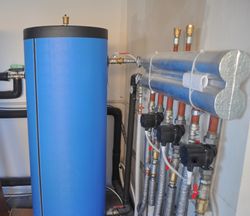FAQ About Geothermal Heat Pumps

No matter what kind of climate you live in or what time of year it is, the temperature of the earth just a few feet below the surface typically remains a constant 45-75 degrees Fahrenheit. Geothermal heat pumps or Ground Source Heat Pumps (“GSHPs”), a heating and cooling technology that has been around since the 1940s, take advantage of these constant and relatively mild subterranean temperatures to provide air conditioning and heating in a manner similar to that of an HVAC system; however, they are also different in many important respects. Here’s an overview of how GSHPs work and the advantages they offer.
What to Know About Geothermal Heat Pumps
What is a GSHP?
Generally speaking, a traditional HVAC system with an air-to-air heat pump provides heating and cooling by “exchanging” heat between interior and exterior air. To heat a building, for example, HVAC systems take heat from exterior air and bring it into the building by using a refrigerant. Once the refrigerant has released all the heat inside the home the refrigerant is pumped back outside to bring back in more heat.
How does it work?
GSHPs provide heating and cooling in much the same way as an air-to-air heat pump unit, but instead of using exterior air as the exchange medium, they use subterranean earth, which is kept at a moderate and constant temperature year-round.
How is a GSHP more energy-efficient than an air-to-air heat pump?
The greater the temperature difference between exterior air and the desired interior air temperature, the more an air-to-air heat pump system has to work, using more electricity in the process. Since GSHPs exchange heat with the more-moderate temperature of the ground instead, they use considerably less energy.
What are the cost savings involved with a GSHP?
 On average, GHPs are approximately 65% more energy-efficient than air-to-air systems due to the reduced amount of energy required. The downside, however, is that a GSHP comes with a larger upfront cost than an tradional systems—both in terms of the equipment and the installation costs. Still, most GSHPs will pay for themselves in terms of savings within 5-10 years, depending on climate. With local rebates and governmental tax incentives available the cost of installation is reduced and the time it takes to pay off your investment is shortened.
On average, GHPs are approximately 65% more energy-efficient than air-to-air systems due to the reduced amount of energy required. The downside, however, is that a GSHP comes with a larger upfront cost than an tradional systems—both in terms of the equipment and the installation costs. Still, most GSHPs will pay for themselves in terms of savings within 5-10 years, depending on climate. With local rebates and governmental tax incentives available the cost of installation is reduced and the time it takes to pay off your investment is shortened.
The reduced amount of work that a GSHP must perform to pull heat from the ground not only saves energy but places less strain on the system as a whole, which saves maintenance expenses and extends the unit’s life span well beyond that of an traditional HVAC system.
Bryant Air Conditioning, Heating, Electrical & Plumbing has been serving residents and businesses of Lincoln, NE, and the surrounding areas since 1952. Interested in switching to a GSHP or need repairs for your current HVAC system? They will ensure that your home is soon comfortable once again. To learn more about their services, visit their website or call them today at (402) 467-1111 to schedule an appointment.
About the Business
Have a question? Ask the experts!
Send your question

